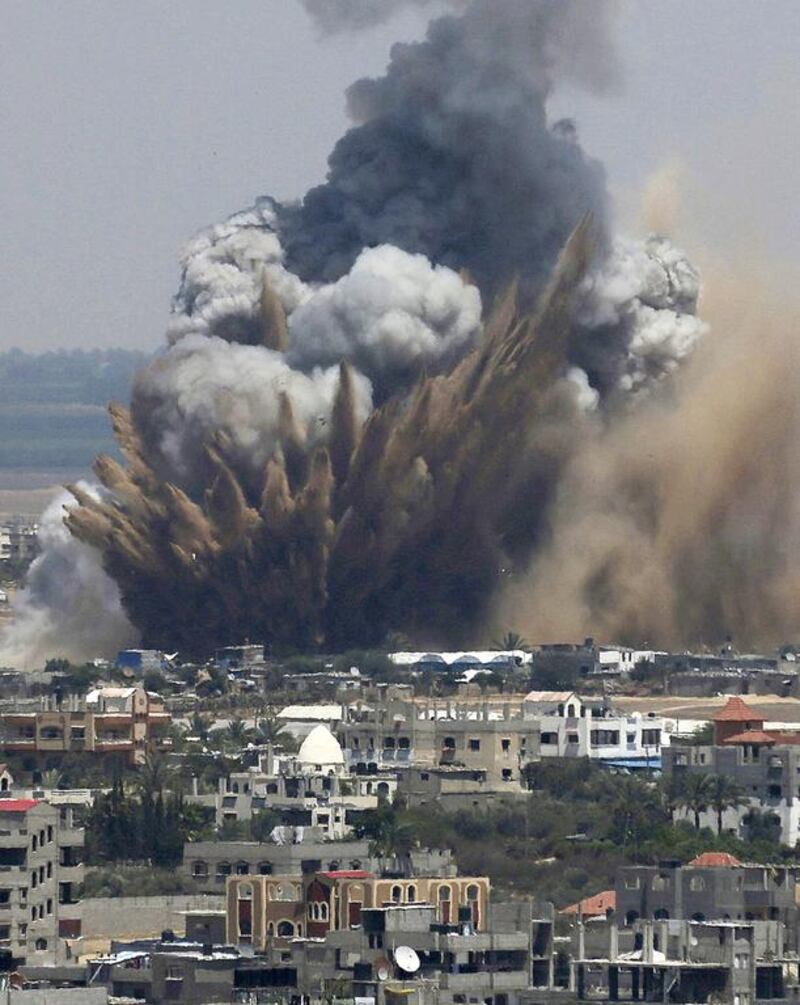BEIRUT // Broke, isolated and possibly unable to replenish its weapons stockpiles, Hamas is entering into another round of violence with Israel from a startlingly weak position.
Fighters from the Gaza Strip, which the Islamist group controls, have fired scores of rockets in retaliation to Israeli air strikes on the besieged-Palestinian territory that have intensified after the killing last month of three Israeli teenagers in the West Bank. Israel has blamed the Islamist group, but has failed to produce evidence. Hamas has denied involvement in the killings.
The escalation in Gaza has reached levels not seen since Israel’s November 2012 assassination of a Hamas militant that triggered an eight-day war that killed about 180 Palestinians and six Israelis. But facing numerous setbacks over the last year, Hamas appears reluctant, and far less capable, to fight their mortal enemy this time around, said Talal Okal, an independent analyst who lives in Gaza.
“It’s an especially risky and difficult time for Hamas to fight a war right now,” he said. “Everything concerning Hamas has gone from bad to worse, and that’s why you saw them initially responding to Israeli aggression with constraint. But with such intense bombing, you can only be constrained for so long.”
However, while Israeli leaders in the past have talked about military assaults to destroy Hamas, they have also come to rely on the relative stability – and capacity to stop rocket fire – that Hamas has brought to Gaza. Toppling Hamas may bring even more radical forces to power in the territory, something that Israeli leaders certainly fear.
The flare-up comes just over a year after Egypt’s military removed from power president Mohammed Morsi, a Muslim Brotherhood member and ideological ally of Hamas. What followed next was a disaster for the Islamist group, which wrested control of Gaza from rival Fatah forces in 2007.
Egypt’s military systematically destroyed the roughly 1,200 tunnels that used to supply Gaza’s 1.7 million residents with subsidised-Egyptian fuel, medicine and building material to circumvent an Israeli siege on the territory. Hamas also benefited greatly from the tunnels, taxing them while using them to bring through rockets and firearms for fighting Israel.
The destruction of the tunnels crippled Gaza’s already frail economy. Unemployment spiked, power outages worsened and residents became even more desperate and angry, while Hamas was deprived of a major source of revenue as well as its only conduits for obtaining weapons.
The group had already lost crucial financial support from former allies in Tehran and Damascus over its decision to back the rebellion against the regime of Syrian president Bashar Al Assad. It also has long been shunned by the West, with the United States and European Union classifying it as a terrorist organisation.
Still, Ahmad Moussalli, professor of political science and Islamic studies at the American University of Beirut, said the renewed fighting would rally local support behind Hamas. It could also inflict further damage to Israel’s international reputation, which has plummeted because of its refusal to stop building Jewish settlements on occupied territory wanted for a Palestinian state.
Israel is widely blamed for torpedoing the US-sponsored peace talks with the Palestinians that collapsed in April.
“Israel is isolated and it’s clear to everyone that it doesn’t want a Palestinian state,” said Mr Moussalli.
But for the time being, Hamas is fighting, even while struggling to keep Gaza afloat. That is a tall task, admit the group’s leaders, who have acknowledged that they can no longer even pay the salaries of Gaza’s 50,000 civil servants.
Hamas had hoped the interim government that it entered into last June with the Palestinian Authority president, Mahmoud Abbas, would assume that burden. Dominated by allies of Mr Abbas, that government — part of troubled reconciliation process between the factions — is supposed to rule Gaza and the West Bank until national elections are held next year.
But so far, no money has been sent to save Gaza. Nor has Mr Abbas offered support to Hamas during the flare-up with Israel, to the chagrin of many Palestinians.
“What you’re seeing now is Hamas being backed into a corner,” said Mr Okal.
hnaylor@thenational.ae





